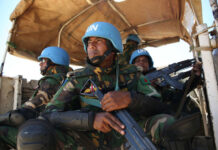Sudan, once hopeful for peace, now reels under a brutal civil war that has led to egregious human rights violations and a catastrophic humanitarian crisis. Since April 2023, the conflict between the Sudanese Armed Forces (SAF) and the Rapid Support Forces (RSF) has spiraled, prompting urgent calls for international peacekeeping forces to intervene.
Documenting atrocities: A UN mandate
Recent reports from the United Nations have highlighted the severe atrocities committed in the conflict. Both the SAF and the RSF are accused of acts of barbarity, including the targeting of civilians, sexual violence, and the use of child soldiers. Particularly alarming are the findings from the UN’s fact-finding mission which documented ethnically motivated attacks, primarily by the RSF against non-Arab communities in the Darfur region. These actions, amounting to ethnic cleansing, have included widespread rape, murder, and the destruction of entire villages.
Deepening humanitarian despair
The human toll is staggering with over 10 million people displaced, and millions more in urgent need of humanitarian aid. Areas like El Fasher in North Darfur face imminent famine, with the existing medical and food supplies dwindling rapidly amid ongoing hostilities. International aid efforts are severely hampered by the violence, with many organizations unable to safely conduct operations. Hospitals and healthcare facilities have been frequent targets, further exacerbating the dire health crisis enveloping the nation.
The international response: Peacekeepers needed
The UN has responded to these alarming developments by calling for the deployment of an independent and impartial peacekeeping force. This call aligns with the recommendations of numerous human rights organizations and the evident inability of the warring parties to protect civilians from harm. Additionally, there’s a push for an international arms embargo, aimed at curbing the flow of weapons to both the SAF and RSF, which could potentially be held accountable for war crimes by international courts.
Ongoing peace efforts and challenges
Despite several rounds of peace talks facilitated by global powers in places like Jeddah and Switzerland, tangible progress has been elusive. The complexity of Sudan’s political landscape, coupled with the vested interests of regional and global powers in Sudan’s natural resources, complicates the peace process. Notably, countries like Egypt, Saudi Arabia, and the UAE, as well as external actors like Russia, have been involved in varying capacities, often driven by strategic and economic interests rather than a straightforward desire for peace in Sudan.
The situation in Sudan remains a critical litmus test for international diplomacy and humanitarian intervention. The call for peacekeepers is a desperate plea to prevent further deterioration of the situation, which threatens to plunge Sudan into deeper chaos. The international community must now balance its strategic interests with the urgent humanitarian and moral imperative to help Sudan restore peace and stability. As the conflict continues, the actions—or inactions—of the world will not only shape the future of Sudan but also set a precedent for responding to similar crises globally.










